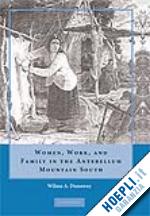
-
DISPONIBILITÀ IMMEDIATA
{{/disponibilitaBox}}
-
{{speseGratisLibroBox}}
{{/noEbook}}
{{^noEbook}}
-
Libro
-
-
SPEDIZIONE GRATUITA
- Genere: Libro
- Lingua: Inglese
- Editore: Cambridge University Press
- Pubblicazione: 03/2008
Women, Work and Family in the Antebellum Mountain South
dunaway wilma a.
117,98 €
112,08 €
{{{disponibilita}}}
Disponibilità Normalmente disponibile in 20 giorni
TRAMA
The nature of female labor in the antebellum Appalachian South was shaped by race, ethnicity, and/or class positions.NOTE EDITORE
Wilma Dunaway breaks new ground to examine the race, class, and ethnic differences among antebellum Southern Appalachian women. Most women defied separate spheres of gender conventions to undertake agricultural and non-agricultural labors that were essential to family survival or community well-being. Unlike elite and middle-class females, Cherokee, black, and poor white women engaged in stigmatized labors and worked alongside males in cross-racial settings. To support their work portfolios, non-white and most poor white women constructed non-patriarchal families that challenged cultural ideals of motherhood. Churches and courts inequitably regulated the sexual behaviors of these women and treated their households as aberrations that were not entitled to the legal privilege of family sanctity. Legal and religious officials sanctioned family break-ups and the removal, indenturement, or enslavement of their children. Still, many women resisted patriarchal conventions through their work lives, family roles, and group activism.SOMMARIO
Introduction; Part I. Racial, Ethnic, and Class Disjunctures among Appalachian Women: 1. No gendered sisterhood: ethnic and religious conflict among Euro-American women; 2. Not a shared patriarchal space: imperialism, racism, and cultural persistence of indigenous Appalachian women; 3. Not a shared sisterhood of subordination: racism, slavery, and resistance by black Appalachian females; 4. Not even sisters among their own kind: the centrality of class divisions among Appalachian women; Part II. Structural and Social Contradictions between Women's Productive and Reproductive Labors: 5. The myth of male farming and women's agricultural labor; 6. The myth of separate spheres and women's non-agricultural labor; 7. Family as privilege: public regulation of non-patriarchal households; 8. Motherhood as privilege: patriarchal intervention into women's reproductive labors.PREFAZIONE
This is the first study of 19th-century Appalachian women. Wilma A. Dunaway moves beyond the black-white dichotomy and the preoccupation with affluent females, and argues that the nature of a woman's work was determined by her race, ethnicity, and/or class positions.AUTORE
Wilma A. Dunaway was born into an interracial family in east Tennessee in 1944. For more than two decades, she worked in civil rights and public services organizations in the Appalachian region. At present, she is an Associate Professor in the School of Public and International Affairs at Virginia Polytechnic Institute and State University. Dunaway is a specialist in international slavery studies, Native American studies, Appalachian studies, and world-system analysis. Her dissertation about the incorporation of Southern Appalachia into the capitalist world economy was awarded a Wilson Fellowship and the Distinguished Dissertation Award from the American Sociological Association. She has won several awards for her previous three works on Appalachia and slavery, including two Weatherford Awards. Her interdisciplinary work has appeared in numerous history and social science journals.ALTRE INFORMAZIONI
- Condizione: Nuovo
- ISBN: 9780521886192
- Dimensioni: 241 x 21 x 161 mm Ø 590 gr
- Formato: Copertina rigida
- Illustration Notes: 10 tables
- Pagine Arabe: 320
